- Home
- Tove Jansson
The Woman Who Borrowed Memories Page 2
The Woman Who Borrowed Memories Read online
Page 2
Time passed and things did not improve. It is difficult when a person one values behaves badly, so much so that no one can rush in and help. In the middle of a sentence, Aunt Gerda would forget whether one of her sister’s children was a boy or a girl and stop abruptly in a panic and then say, very softly, “I mean, how is your . . . child?” She introduced herself to people she’d known for years, and her fear was so visible that it cast gloom on everyone she knew.
It is important to describe all this in order to understand Aunt Gerda’s behavior in the late winter of nineteen hundred seventy.
Probably few of us pay adequate attention to all the things constantly happening to the people we love, a steady, compact mass of activity that can be grasped in its entirety only by a person like Aunt Gerda—before she changed, of course. Loved ones take exams and degrees or fail to take them; they get raises and grants or fail to get them; they have children and miscarriages and neuroses; they have trouble with the help and their sex lives and teenage rebelliousness and misconceptions and money and maybe their stomachs or their teeth; they lose their faith or their jobs or their self-confidence or the person they’re trying to live with and then lose themselves in politics or self-deception or disappointment or ambition; they get disloyalty and funerals and all sorts of frights thrown right in their faces; and eventually they get wrinkles and a thousand other things they hadn’t expected—and I had all of that in the palm of my hand, thought Aunt Gerda in distress. It was all as clear as an etching and I made no mistakes! I never made a mistake. What is it that’s happened to me?
She often woke at night and was unable to fall back to sleep. Sometimes she wondered where the calm, happy people might be found, if such people even existed, and whether she might dare to let herself be captivated if she ever did find them. No, Aunt Gerda thought. They too carry some secret weight, they too hide some burden that they want to share.
Letters, gifts, and affection’s glossy greetings are important. But the ability to listen face-to-face is even more important, a great and rare art. Aunt Gerda had always been a good listener, aided perhaps by her difficulty in expressing herself and by her lack of curiosity. She had been listening to friends and relatives ever since she was young, listening while they talked about themselves and each other, carrying them with her in a huge, artfully constructed mental map of crisscrossing lives. She listened with her whole large, flat face, unmoving, leaning slightly forward, with downcast eyes, though she would occasionally look up, quickly and in obvious distress. She didn’t touch her coffee and let her cigarette burn down. Only in the short pauses that even a tragic tale leaves open for trivial but necessary explanations did she permit herself a lungful of smoke and a deep swallow of coffee before replacing the cup on its saucer carefully and without a sound. In essence, Aunt Gerda was not much more than silence. Afterward, it was difficult to reconstruct what she had said, maybe only a breathless questioning—Yes? Really?—or a quick expression of sympathy.
As the years went by and Aunt Gerda’s weight of insight grew, it troubled no one that she knew so much about them. They counted on her protective faculty; they let themselves be misled by her peculiar air of innocence and neutrality. It was like telling secrets to a tree or a devoted pet and never having afterward that queasy feeling that you’ve given yourself away. But now it was as if Aunt Gerda had lost her innocence. Her broad face listened the same way—open, unfurrowed—and though her brief expostulations were the same, they had lost something of their shyness and the simple desire to know in order to understand and so to love. There was not the same pain in her eyes, and she had developed an annoying, involuntary gesture that was, perhaps, apologetic.
Not many of them called Aunt Gerda that winter and spring. Her apartment grew very quiet and peaceful, she listened only to the elevator or sometimes to the rain. She often sat at her window and watched the change of seasons. She had a bay window in a semicircular projection that was rather chilly. The window was round and now in March embellished with icicles. The spikes of ice were thick and finely chiseled by running water. In the evening, they turned blue. No one called and no one came. It seemed to her the window was a great eye looking out over the city and the harbor and a strip of the gulf under ice. The new silence and emptiness was not entirely a loss, it was something of a relief. Aunt Gerda felt like a balloon, untied, soaring off its own way. But, she thought, it’s a balloon that’s bouncing against the ceiling and can’t get free.
She understood that this was no way to live, human beings are not built to float. She needed an earthly anchor of meaning and care so she didn’t get lost in confusion. One day, with water dripping from the eaves, Aunt Gerda decided to exercise her memory and pull herself back to the simple plane where her life had its justification. She made a list of the devoted people she could remember and of their children and grandchildren and other relatives and made an earnest effort to remember when they were all born. The paper was much too small. Aunt Gerda rolled out a long piece of shelf paper on the dining-room table and held it down with thumbtacks. She made a big black dot, a round head for each of them, with the name and birth date and title in a pretty little oval. She placed their children alongside, connected to their parents with a red line. She put all romantic relationships in pink—double lines for unconventional or forbidden alliances. Aunt Gerda became engrossed. Some heads were burdened with perfect coronas of pink—like galactic suns, impressive and probably regrettable.
For the first time, Aunt Gerda became aware of her own private commentary, which was not entirely benign. She bought crayons in new colors and worked on conscientiously—divorces in violet, hate in crimson, loyalty lines in bright cerulean. The dead were gray. She left space for memory to provide all the facts and data that fill and surround a life. She had time now to remember. Time was no longer a danger, it moved in parallel with herself and later on she would nail it down in a neat little oval. Aunt Gerda noted thefts of money, of children, of work and love and trust. She remembered those who drowned one another in bad conscience or who froze each other out. She drew their lines and erased them to make them more precise. Time was no longer bifurcated, and she listened only to her inner voice. Her memory delivered up tones of voice and silences, faces that clenched and went naked and then closed again, and all the mouths that talked and talked. Aunt Gerda gathered them all and put them to good use. What she wrote in the ovals lost its weight and its pain but retained its meaning. Aunt Gerda’s memory opened like a great seashell, every twist was clear and exact and retained its echo. Even very distant echoes came gradually closer, like whispers.
As the spring wore on, Aunt Gerda transferred her great life map onto better, thicker paper. She was bothered a little by repetitions that might strike some as banal, but all human behavior follows quite primitive rules. And anyway she did have one unique event—an attempted murder. She inscribed it in purple and felt a little cold thrill, maybe not unlike the thrill a stamp collector feels when he fastens a priceless misprint into his collection.
Sometimes Aunt Gerda sat quietly without trying to remember, simply immersed in her solar system of past and emerging lives, sensing the future changes in the lines and ovals, inevitable in the light of obvious cause and effect. She felt a desire to forestall what must happen, to draw her own lines, new lines, maybe in silver and gold since all the other colors were taken. She toyed recklessly with the idea of making the dots and ovals movable, game pieces that could shift their context and create new constellations and entanglements.
Now and then the telephone rang, but Aunt Gerda said she had a cold and couldn’t see anyone.
Toward the end of April, Aunt Gerda began to draw a frame around her map, a frame of small, peculiar ornaments, not unlike the distracted figures a person doodles in a telephone directory while listening. She was listening, inwardly, to words in short sentences that summarized what she knew.
Her nephew called and asked if he might drop by, but Aunt Gerda replied that she hadn’t th
e time. The map was approaching its ultimate meaning. It was at a critical stage and would tolerate no interference.
The large planets hold the small ones in place with a firm grip. Satellites follow their predetermined paths. And the strong lines of the dead cross all the others, the double lines, the dotted lines, the coiled lines. Calculation, disappointment, and loss. Aunt Gerda had drawn the beautiful relationships in such light colors that they were hidden by the stronger colors, and perhaps some of them had been erased in the course of her work. Now she drew only words, in short intensive sentences, each of which summarized a truth. Each of them was meant for someone to listen to very carefully. Did you know it was your fault he died? Do you know that you’re not the father of your daughter? That your friend dislikes you? The map immediately needed alteration and Aunt Gerda drew her first line in gold. It was a terrifying and irresistible mental game that she called “the fatal words.” It could only be played in the evening by the window. She realized that such words must be uttered only at long intervals, if they were ever really uttered at all. Eight, nine words were sometimes enough for widespread and lasting alterations to the great map on the dining-room table. And later, when the time was right, new words for a new listener and once again the picture would change. The effects could be estimated and predicted, like when you play chess with yourself. Aunt Gerda remembered some lines of poetry she’d read as a child.
Frithiof sat with Björn the true
At the chessboard, fair to view;
Squares of silver decked the frame,
Interchanged with squares of gold.
She would draw her lines of silver and gold, then wait, perhaps quite a while, then draw another line. She had time, and the material was inexhaustible.
It was early in May. Far into the bright nights she sat by the window and played her great, dangerous game. She didn’t light the lamps. The nights were luminous—the transparent, lingering blue that comes with spring. She didn’t need to look at the map, she knew it by heart. As she formed and spoke the words, the lines and ovals moved and the colors steadily changed. For the first time in her life, Aunt Gerda had the sweet and bitter experience of power.
When the weather grew warmer, she opened the window, put on her coat, covered her legs with a blanket, and sat in the bay to look out at the city and the strip of open water. Now she could hear footsteps and voices down on the street, every sound clear and distinct. All the passersby seemed to be on their way to the harbor. It seemed to Aunt Gerda that the rooms where she lived no longer enclosed her, they had turned outward and away. The too luminous night was suddenly disquieting and made her sad. She began to think about all the things happening out there right now that she knew nothing about. All the time, every minute, something was happening out there.
Aunt Gerda sat quite still for a long time, then she threw off her blanket and went out into the hall. She called her nephew and asked him if he’d like to come by for a while and talk about his painting, but he was busy and couldn’t come. “Painting?” he said. “That was a long time ago, Aunt Gerda. I’m working for Papa now.”
She hung up the phone and went into the dining room. Her map was indistinct in the half-light. At the moment, it resembled one of those old representations of the earth seen from the sky, drawn at a time when the known islands were huge but the unknown continents vanishingly small.
Aunt Gerda was a perfectionist. It is possible that she didn’t know it or even know that sharp, lovely word. But in her opinion, a thing half done was meaningless. Time had tricked her, dreadful time, which she once again had wasted. Her map was invalid. She rolled it up carefully, fixed it with three rubber bands and wrote, “To be burned unread after my death.” It was a beautiful piece of work, Aunt Gerda thought. It would in fact be a shame if none of them looked at it anyway. She put the map on the highest shelf in the hall closet and closed the window. The footsteps and voices on the street disappeared. Then she lit the lamp above the dining-room table and got out her box of shiny pictures and pressed flowers. One by one she lay them on the table and remembered what they looked like. Then with a single motion of her large, clever hand, Aunt Gerda swept all the pretty pictures back into their box. Several specks of glitter had fallen on the rug and glowed there as blue as the night outside.
Translated by Thomas Teal
BLACK-WHITE
Homage to Edward Gorey
HIS WIFE’S name was Stella, and she was an interior designer—Stella, his beautiful star. Sometimes he tried to sketch her face, which was always at rest, open and accessible, but he never succeeded. Her hands were white and strong and she wore no rings. She worked quickly and without hesitation.
They lived in a house that Stella had designed, an enormous openwork of glass and unpainted wood. The heavy planking had been chosen for its unusually attractive grain and fastened with large brass screws. There were no unnecessary objects to hide the structural materials. When dusk entered their rooms, it was met with low, veiled lighting, while the glass walls reflected the night but held it at a distance. They stepped out onto the terrace, and hidden spotlights came on in the bushes. The darkness crept away, and they stood side by side, throwing no shadows, and he thought, This is perfect. Nothing can change.
She never flirted. She looked straight at the person she was speaking to, and when she undressed at night, she did it almost absentmindedly. The house was like her, its eyes were wide open, and sometimes he worried that someone might look in on them from the darkness. But the garden was surrounded by a wall, and the gates were locked.
They often entertained. In the summer, they hung lanterns in the trees and Stella’s house resembled an illuminated seashell in the night. Happy people in strong colors moved within this picture in groups or in twos and threes, some of them inside the glass walls and some outside. It was a lovely pageant.
He was an illustrator. He worked mostly for magazines; now and then he did a book jacket.
The only thing that bothered him was a mild but persistent pain in his back, which may have resulted from the excessively low furniture. There was a large black bearskin in front of the fireplace, and sometimes he wanted to lie on it with outstretched arms and legs, bury his face in the fur and roll around like a dog to rest his back. But he never did. The walls were glass, and there were no doors between the rooms.
The large table by the fireplace was also of glass. He was in the habit of laying out his drawings on it in order to show them to Stella before sending them on to the client. These moments meant a great deal to him.
Stella came and looked at his work. “It’s good,” she said. “Your use of line is perfect. All I’m missing is a dominant element.”
“You mean it’s too gray?” he said.
“Yes,” she said. “It needs more white, more light.”
They stood at the low table and he saw his drawings from a distance. They really were very gray.
“I think what it needs is black,” he said. “But you need to look at them up close.”
Afterward he thought for a long time about black as a focus. He was uneasy, and his back was worse.
The commission came in November. He went in to his wife and said, “Stella, I’ve been given a job that really intrigues me.” He was happy, almost excited. Stella put down her pen and looked at him. She was always able to interrupt her work without annoyance.
“It’s a terror anthology,” he said. “Fifteen stories, with black-and-white illustrations and vignettes. I know I can do it. It suits me. It’s my kind of thing, don’t you think?”
“Absolutely,” said his wife. “Are they in a rush?”
“Rush!” he burst out, and laughed. “This isn’t some two-bit assignment, this is a serious piece of work. Full pages. They’re giving me a couple of months.” He rested his hands on her worktable and leaned forward. “Stella,” he said gravely, “I’m going to use black as a dominant element. I’m going to do darkness. Gray, well, I’ll only use gray when it’s like holding y
our breath, like when you’re waiting to be afraid.”
She smiled. “It’s so nice you’ve got something you find interesting.”
The text arrived, and he lay down on his bed and read the first three stories, no more. He wanted to begin work believing that the best material would come further on and so retain his expectations as long as possible. The third story gave him an idea, and he sat down at the table and cut himself a piece of thick, chalk-white rag paper with an embossed maker’s mark in the corner.
The house was quiet and they weren’t expecting guests.
It had been very hard for him to get used to this paper because he couldn’t forget how much it cost. Drawings on less expensive paper tended to be freer and better. But this time it was different. He loved the feel of the pen as it ran across the elegant surface in clean lines and at the same time he relished the barely discernible resistance that brought the lines to life.
It was midday. He closed the drapes, turned on the lamp, and began to work.
They ate dinner together, and he was very quiet. Stella asked no questions. Finally he said, “It’s no good. There’s too much light.”
“But can’t you close the drapes?”

 Comet in Moominland
Comet in Moominland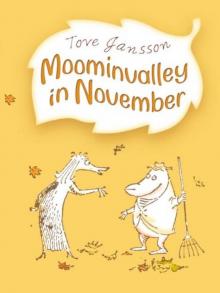 Moominvalley in November
Moominvalley in November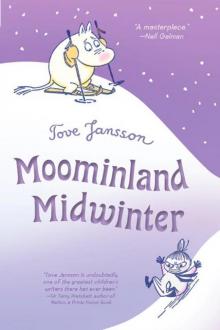 Moominland Midwinter
Moominland Midwinter Moominpappa's Memoirs
Moominpappa's Memoirs Sculptor's Daughter
Sculptor's Daughter The Listener
The Listener Tales From Moominvalley
Tales From Moominvalley Letters from Tove
Letters from Tove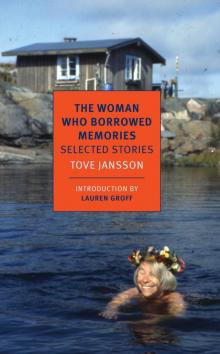 The Woman Who Borrowed Memories: Selected Stories
The Woman Who Borrowed Memories: Selected Stories Travelling Light
Travelling Light Finn Family Moomintroll
Finn Family Moomintroll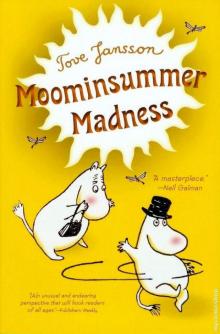 Moominsummer Madness
Moominsummer Madness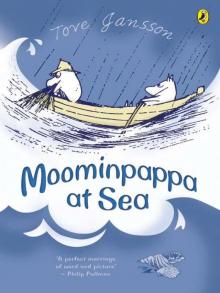 Moominpappa at Sea
Moominpappa at Sea Fair Play
Fair Play Letters From Klara
Letters From Klara Art in Nature
Art in Nature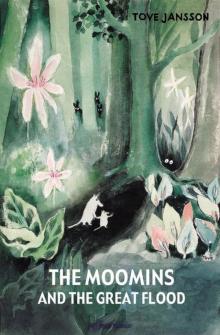 The Moomins and the Great Flood
The Moomins and the Great Flood The Exploits of Moominpappa
The Exploits of Moominpappa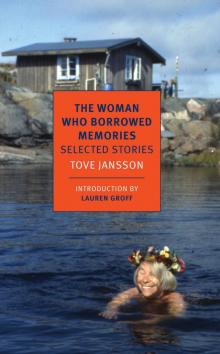 The Woman Who Borrowed Memories
The Woman Who Borrowed Memories